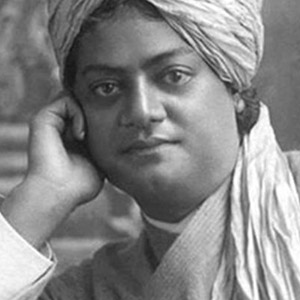
Vivekananda (1863 – 1902) was an Indian Hindu monk, a chief disciple of the 19th-century Indian mystic Ramakrishna. He was a key figure in the introduction of the Indian philosophies of Vedanta and Yoga to the Western world and is credited with raising interfaith awareness, bringing Hinduism to the status of a major world religion during the late 19th century. He was a major force in the revival of Hinduism in India. He first introduced Hinduism at the Parliament of the World’s Religions in Chicago in 1893, and over his lifetime conducted hundreds of public and private lectures and classes, disseminating tenets of Hindu philosophy in the United States, England and Europe.

Quotes by Vivekananda…
Just as by the telescope and the microscope we can increase the scope of our vision, and make higher or lower vibrations cognizable to us, similarly, every man can bring himself to the state of vibration belonging to the next plane, thus enabling himself to see what is going on there.
Be like the pearl oyster. There is a pretty Indian fable to the effect that if it rains when the star Svati is in the ascendant, and a drop of rain falls into an oyster, that drop will become a pearl. The oysters know this, so they come to the surface when that star shines, and wait to catch the precious raindrop. When one falls into the shell, quickly the oyster closes it and dives down to the bottom of the sea, there to patiently develop the drop into the pearl. We should be like that. First hear, then understand, and then, leaving all distractions, shut our minds to outside influences, and devote ourselves to developing the truth within us.
All the various ideas that arise making us believe that we require something external to make us happy are obstructions to that perfection.
If you want to be an astronomer you must go to the observatory, take a telescope, study the stars and planets, and then you will become an astronomer. Each science must have its own methods. I could preach you thousands of sermons but they would not make you religious, until you first practiced the method. These are the truths of the sages of all countries, of all ages, men pure and unselfish, who had no motive but to do good to the world. They all declare that they have found some truth higher than that the senses can bring to us, and they challenge verification. They say to you, take up the method and practice honestly… So we must work faithfully, using the prescribed methods, and light will come.
It is necessary to study the mind itself, mind studying mind. We know that there is the power of the mind called reflective. I am talking to you; at the same time I am standing aside, as it were, a second person, and knowing and hearing that I am talking. You work and think at the same time, another portion of your mind stands by and sees that you are talking. The powers of the mind should be concentrated and turned back upon itself, and as the darkest places reveal their secrets before the penetrating rays of the sun, so will this concentrated mind penetrate its own innermost secrets… It will all be revealed to us.
Whatever we are now, is the result of our acts and thoughts in the past; and whatever we shall be in the future, will be the result of what we think and do now… When it comes, the higher powers and possibilities of the soul are quickened, spiritual life is awakened, growth is animated.
This external world is but the gross form of the internal, or subtle. The finer is always the cause and the grosser the effect. So the external world is the effect, and the internal the cause. In the same way external forces are simply the grosser parts, of which the internal forces are the finer. One who has discovered and learned how to manipulate the internal forces will get the whole of nature under his control… He will be master of the whole of nature, internal and external.
We are taking that which is bad for that which is good, and that which is a dream for that which is real. Soul is the only reality, and we have forgotten it.
The internal nature is much higher than the external, and much more difficult to grapple with, much more difficult to control; therefore he who has conquered the internal nature controls the whole universe; it becomes his servant.
When I am angry my whole mind has become a huge wave of anger. I feel it, see it, handle it, can easily manipulate it, can fight with it, but I shall not succeed perfectly in the fight until I can get down below. A man says something very harsh to me, and I begin to feel that I am getting heated, and he goes on till I am perfectly angry, and forget myself, identify myself with anger. When he first began to abuse me I still thought, “I am going to be angry.” Anger was one thing and I was another, but when I became angry, I was anger. These feelings have to be controlled in the germ, the root, in their fine forms, before even we have become conscious that they are acting on us.
